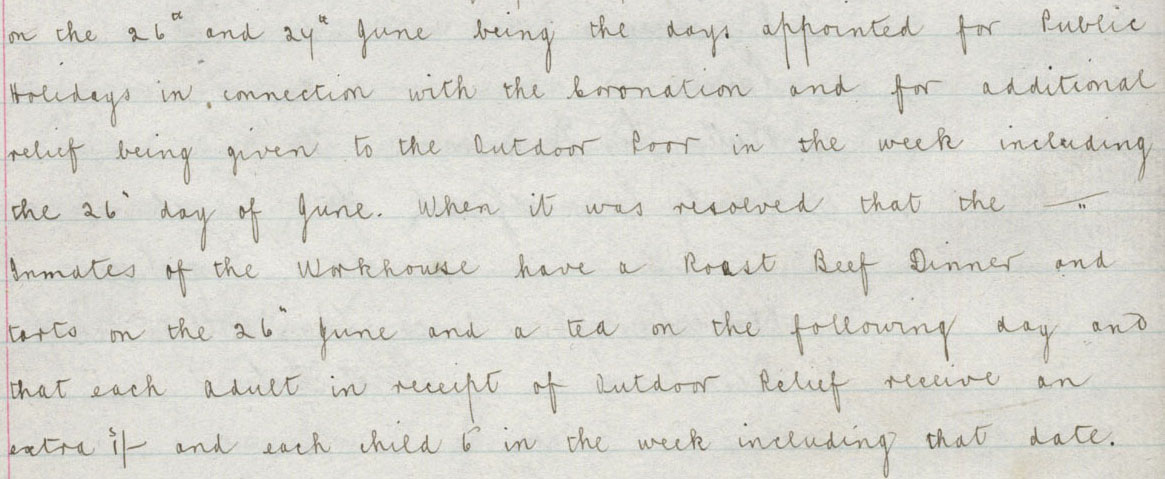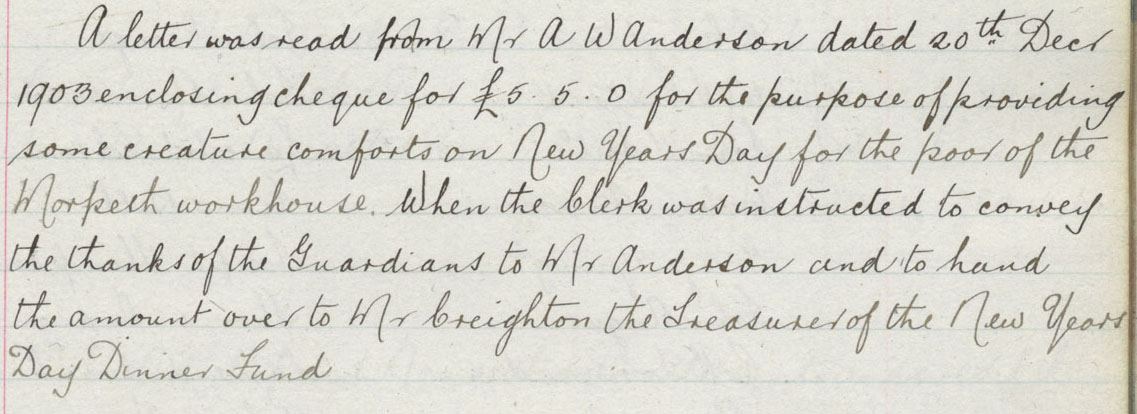Life inside the workhouse was designed to be difficult in order to act as a deterrent and ensure that only the truly destitute would apply. The common image portrayed is of inmates having bread and gruel, wearing uncomfortable coarse uniforms and doing heavy manual labour such as stone breaking. The Minute Books for Morpeth and Hexham Workhouses reinforce that life was hard but they also provide evidence that staff and patrons were often kind and provided treats and entertainment for paupers and were concerned about their health and welfare.
Public holidays were declared for the Coronation of Edward VII and inmates at Morpeth Workhouse were given a roast beef dinner and tarts on the 26th June 1902 and a tea on the following day. In conjunction with the Coronation, children at Hexham workhouse were given mugs as a souvenir. The mugs were gifted by Sir John Swinburne and a vote of thanks to him is documented in the Minute Book on 8th July 1902.

GMO/1

GHE/12
The Minute Book entries below prove that Christmas and New Years Day dinners were given to pauper inmates and that other treats were allowed to be brought into the workhouse. Rich patrons often donated gifts of beer, biscuits and mince pies which were gratefully excepted. This was advantageous as it meant that paupers were provided with treats that did not have to come out of Union funds.

GMO/1

GHE/12
This Minute Book entry from December 1903 records a cheque being received at Morpeth Workhouse from a Mr Anderson for the purpose of providing some ‘creature comforts’ on New Years Day.

GMO/1
Workhouse inmates were also given treats at Easter. One such instance is recorded in the Hexham Guardian Minute book on 18th March 1902 when it is recommended that paupers have the usual outing on Easter Monday afternoon from 1pm to 5.30pm. Unfortunately it does not state where they were going to. Inmates received entertainment within the workhouse as an entry in the Hexham Minute Book on 11th December 1900 shows that paupers were treated to a magic lantern entertainment show by Mr James, Mr Shield and their assistants.


GHE/12
There were many children living in the workhouse. If an able-bodied man was admitted then his whole family had to join him. Orphans and abandoned children often ended up in the workhouse and many were in ill health. Children were also placed in homes which often provided a more comfortable environment for them to live in. The extract below shows an entry from December 1904. The Medical officer at a home in Cullercoats recommends that a child named Rose Foster, aged 6, should have a change of air at Rothbury for a month or two. Although the child is resident in Cullercoats, the Guardians of Morpeth Union contributed to her maintenance so needed to give their permission for her to reside in another area. The Guardians must have been concerned about her state of health as they agreed to the request. Care for inmates is also evident at Hexham workhouse as an entry for December 1900 records a request to give the old and sick women tea and provide oranges for children. The request was later approved.

GMO/1

GHE/12

I get great pleasure from reading your posts. Keep up the hood work
Good work
Thank you very much for your comment Carol.